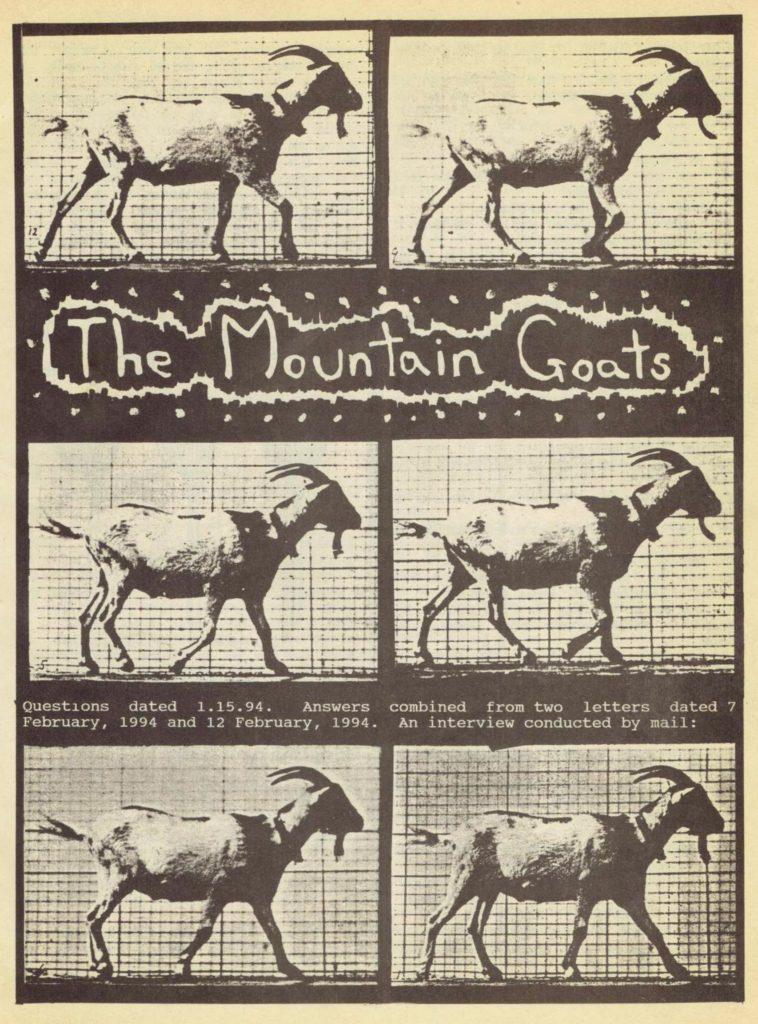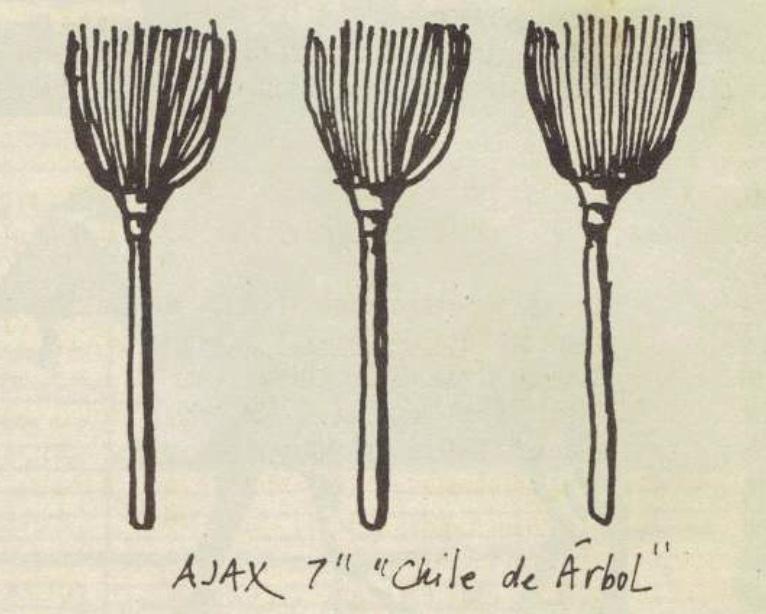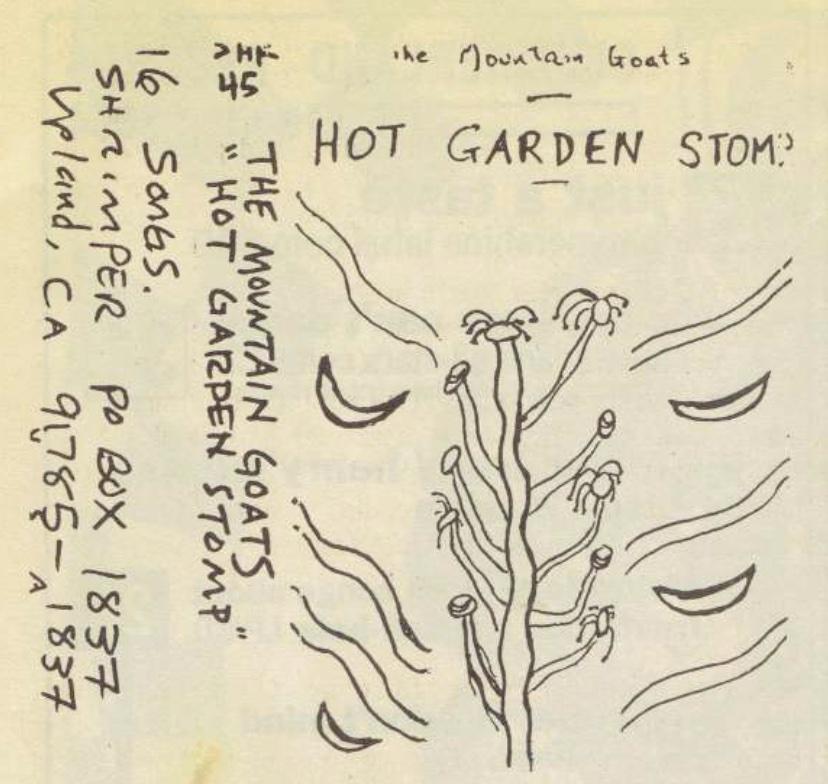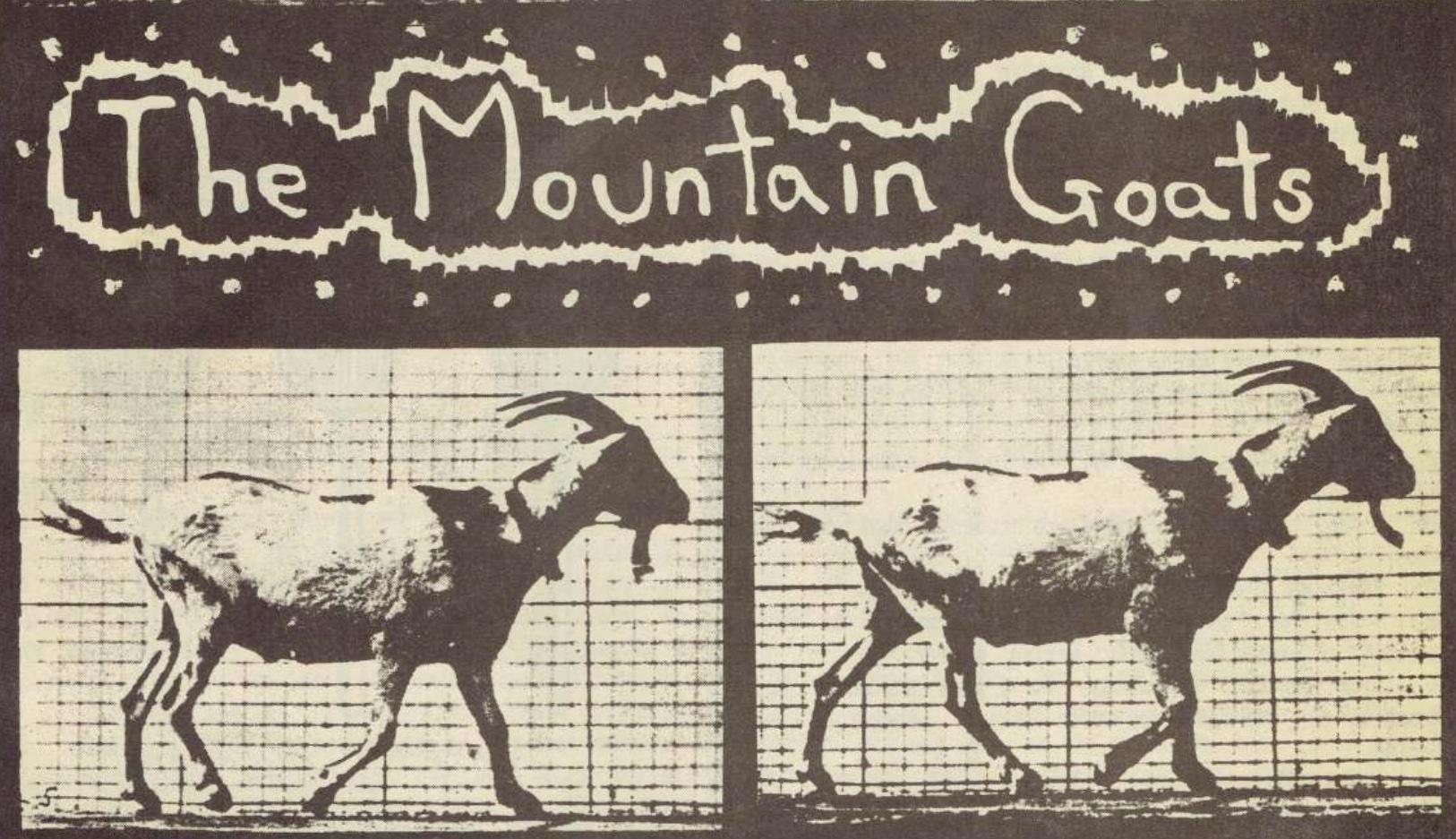
Woolly Bugger: First off, to whom are these questions being asked?
John Darnielle: John. If there were more time, I’d get everybody together, but it’s just a big mess out here.
A Information
WB: Who does the membership of the Mountain Goats include at this very moment?
JD: John, Rachel, Amy, Sara, and Rosaaane.
WB: Which of these members play live and which of these members play on the recordings?
JD: All in various combinations. Amy lives on the East Coast now so that’s tricky, but she sings on “The Window Song” and “The Water Song”.
WB: When and Where did the Mountain Goats begin?
JD: In Norwalk, California circa 1991; concurrent exponential growth in the Browning building at Scripps.
WB: When and Where was your first live appearance?
JD: Ha! I can answer this! Scott and Katherine’s loft in Pomona on New Years Eve two or three years ago.
WB: Has there ever been a Mountain Goats tour?
JD: No. Nor will there be, ever. If we should happen to be out of town and someone asks us to play, OK; otherwise, to hell with touring.
WB: Besides the band, what do each of you do in Claremont?
JD: We live here or nearby. Some of us work.
WB: For those of you who are students what do you study?
JD: English, Classics, Comparative Literature.
WB: For you, does school have anything to do with getting a job and eventually making money?
JD: Yes but no. Knowledge is a joy in itself, but teaching is the only job worth having: therefore yes but no.
B Recording
WB: What brand and model of tape recorder do you use?
JD: Magnavox A28 100; Panasonic RX-FT 500. I had to look at both machines to answer this question, though.
WB: Have you chosen to record with the low-fi one-track as you do for the sake of convenience or for the aesthetic of low-fi?
JD: I don’t think of it as “low-fi” because I think that our methods have a higher degree of “fidelity” to the actual sound. Multiple track recording is seldom any good for anybody.
WB: How much time comes between the moment a song is written and the moment a song is recorded?
JD: Usually, none. The song is written and recorded immediately. This is not always the case, though. Occasionally, months pass. No hard-and-fast rule.
WB: By recording and releasing your recordings you make it possible for people to listen to your music when you’re not playing it. I’ve spoken with people making music who think that recording is somewhat of an artistic compromise they don’t feel so great making because the reason they make music is that they enjoy or need the feeling they get from playing it. By recording, you’re putting your music into a form that allows your music to be listened to and played without you being there to enjoy the feeling you get from playing it live (that’s the point I’ve heard, anyways). What do you think?
JD: I like recorded music and always have. The area I’ve bracketed strikes me as hopelessly selfish. I like the feeling one gets playing, but I record songs because I want people who like them to hear them…. I don’t mean to slight the question; I think it’s a rather good question. Instinct is the best judge: when I listen to my recorded output I hear no compromise. If I used multiple tracking, that would be a different story, but I don’t, so it’s not.

C Songs
WB: I’m constantly trying to record the details of all that surrounds me. I use a journal. Many of your songs seem to do this type of record-keeping as the lyrics seem to note exact details such as time of day, place, color, precise objects present, whether it was a seal or a raccoon, and so on. Does the inclusion of these details in your song’s lyrics happen naturally, or are they there on purpose because you think it’s important that they be included?
JD: This is a question of craft. Few of the details are “true”–almost none of this stuff really happened. The right details can make it seem like it’s all true; so in that sense, it’s important that these details be included. Also, someone (Michelangelo? don’t remember) said, around a similar question: “God is in the details,” and I think that’s true; without detail, things seem flat and lifeless, and moreover there would be no such thing as pinstripes if there was no detail. Ha, ha, ha.
WB: How much has your songwriting been shaped and affected by The Classics? (stemming from the fact that Shakespeare, Caligula, Ennius, Chaucer, and the Scripps Classics Dept. have either been quoted of thanked in the papers that accompany Mountain Goats recordings)
JD: The big names teach us the importance of emotion and control in writing. How’s that for pompousness? In other words, their influences could not be measured: too immense.

D Music and the Arts
WB: What are your five favorite books/pieces of writing?
JD: I thought about this, and I just can’t make a ranking. Chaucer’s The Canterbury Tales is certainly one of the two or three best things ever written in English, and that’s no surprise. Sophocles seems to have never missed a beat, and Oedipus at Colonus is a prolonged spasm of genius. Petronius is magnificent; so is Juvenal, and so is Horace, the best of these being especially good in the Carmina. For that matter, Chaucer’s Troilus and Criseyde may even be a better piece of work than The Canterbury Tales. I have this idea that Suetonius, the Roman historian, may be a really great writer whose talents are underestimated because of his situation (historian), but I don’t know him well enough to say that with authority. I have a strong liking for 18th-century British literature, too, but this paragraph has gone on too long. –Rachel is into 19th-century British folks. Go figure.
{ADDENDUM}: Modern literature is practically a complete waste of time. You have to wade through so much indulgent kelp to get to the good stuff that it’s hardly even worth it. Free verse poetry is a waste of trees and perfectly nice ink. Joan Didion is any twenty other modern writers; even she is no match for Juvenal (2nd-century, Rome).
WB: Top 5 albums ever?
JD: I’m more interested in songs than in albums, but here are five pretty unassailable records: 1. The Gun Club, Fire of Love. 2. The Stockholm Monsters, Alma Mater. 3. Killdozer, Little Baby Buntin’. 4. The Band, Music from Big Pink. 5. James Brown, Star Time: which is a boxed set, but it’s just so good. But the problem with making a top five list is obvious. I haven’t listed Steely Dan, nor Chopin’s Mazurkas, nor Nick Cave, but any of those have things as strong as anything on the list. So, I have no top five. If I could only keep one album it would be the most recent one bought, which was Solid Brass by Circus Lupus.
{ADDENDUM}: Somewhere along the line I lost the urge to tell everyone what my favorite records are. funny, because I used to annoy my friends by telling them “You must buy such-and-such a record” or “this here record is so damned cool.” I think that when I wasn’t paying attention music became more personal for me than it used to be. I will say, though, that if I were to make out a top five album’s list, Refrigerator’s Rael (their second cassette) would probably be right up there at the top, sneering down at the competition. Somewhere else on the list would be the Gun Club‘s Fire of Love, which just gets scarier every year. Maybe Ana Gabriel’s Mi Mexico would be in there, too. I don’t know, I listen to different records for different reasons, so it’s hard to make an all-around top five.
WB: What bands/recordings have you each been listening to the most lately (month or so)?
JD: Gun Club; Toni! Tony! ‘Tone!; (early) Aretha Franklin; The Five Blind Boys of Alabama; that Circus Lupus album, Bob Marley and The Wailers Catch a Fire–which is really, really good–and, of course, Furniture Huschle, and the unbelievable new(er) Refrigerator stuff.
WB: How in-touch with present-day pop-culture would you each consider yourselves to be?
JD: I’m not proud about it or anything–well, OK, I am maybe a little proud about it–but I am completely out of the loop. Don’t know much about much of anything that’s going on and don’t particularly care to. I prefer pinball to video games. Rachel, Sara, Amy and Rosanne are way more on top of things than I am, though none of us even have the faintest notion of what Pavement sounds like, so you can see that while our in-touchness runs along a spectrum, we’re all to some degree insulated.
WB: Do you think Lionel Richie meant a word of what he was saying as he sang the “down-on-his-luck” sad lyrics of “Sail On”? (‘cause I think you made it sincere…)
JD: This is a leading question. Maybe the original doesn’t move you, but neither of us “mean it”–if it sounds sincere, I mean to but it’s not like I sang it ‘cause I was depressed or anything. When I’m singing it, it seems real to me–and I think Lionel Richie probably has similar experiences in performance–but sincerity, man, that’s just a real slippery issue. Remember, Lou Reed wrote “Heroin” (a convincing song if ever there was one) before he’d ever even touched the stuff. This sounds kinda precious, I know, and I am genuinely grateful for the kind words, but I think the genuine/false binary is too convenient. Do the Grifters “mean it” when they sing “She Blows Blasts of Static”? No, but it’s a great song, and sounds emotional as all hell.
